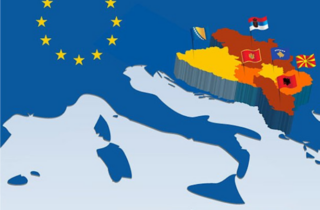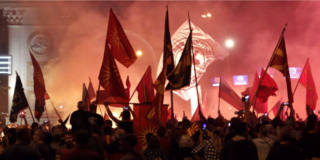
By Olja Bichkovska
How would a Balkan state react in case the EU implemented the idea of “European” as a national identity? Let’s take a hypothetical situation using my home country, North Macedonia. Will the, hopefully soon, integration come easy in this case and make the people accept being identified as European alongside North Macedonian? Or will their strong sense of national identity overpower the whole idea? I will also use Daniel Gabrielsson Master’s Thesis, NATIONALISM IN EUROPE: A quantitative study about the relationship between different kinds of nationalism and liberal democracy (2017), to explain my reasoning better from a scholarly aspect as I believe he explains nationalism in a clear manner.
Balkan view of the European Union:
So, how will people outside of Europe react after being integrated in the Union and then being told they also have to be called “European” alongside their own nationality? Will they feel European, so easily accept the idea, or just want the benefits and rights which they will derive from the EU? Truthfully, coming from an Eastern European, the Balkans will see it as more of an economic benefit rather than being part of a big community. Why do I believe this? It depends on the fact that outlooks change depending on where the country is located. Why? History, past. To say it more studiously, Gabrielsso wrote: “The mean scores for each country and each region (East/West) on the three dimensions showed that East European countries consider cultural and ethnic criteria more important markers of nationhood than the Western countries. The difference between the regions is being the largest on the ethnic dimension. Regarding the political dimension, it is deemed less relevant by the Eastern countries. Hence, the results are clearly in line with the ethnic-East/civic- West argument. An important reason why this contradicts previous results is probably because ‘ancestry’ is included”. Then he continues to apply this differentiation to states through the use of Hans Kohn work: “In the classical work The idea of nationalism: A study in its origins and background (1944), Hans Kohn argued that Western Europe emphasised the political dimension of nationhood, while the nation-states of Eastern Europe tended to emphasise the ethnic and cultural dimension of belonging. He used these labels, ‘Western’ and ‘Eastern’, to denote both the geographic locations of countries on the European continent and two ideal-types of nationhood: civic and ethnic.”
Civic vs ethnic nationalism:
What do they mean by civic and ethnic when they talk about nationalism? Gabrielsson explains this differentiation: “Ethnic nationalism emphasises citizenship based on common roots, a congenital inheritance that engenders emotional attachment, implying an ethnic fraternity. Put simply, this version of nationalism takes ethnicity, as an ascribed trait, as the foundation of membership in the nation-state. In contrast, civic nationalism emphasises consent to laws, including those that define rights to citizenship, and a shared political state- like organisation, which is a result of rational choice and rational attachment. Thus, the loyalties of the group members are ‘civic’, as opposed to ‘ethnic’, in nature.”
North Macedonia’s nationalism:
In the case of North Macedonia, the strong feeling of being Macedonian stems from the long lasting oppression and what seems like a never ending fight for independence and liberty. Therefore, Macedonians will seek to hold their stance on being an independent state rather than being considered as European. The longer the history which is based on needing to be united, the bigger the sense of nationality and fear of losing something which has taken so long to acquire. Therefore, the idea of identifying as a part of a union of states may seem difficult, as there is no historical connection or weight of the connection. The effect of nationalism on people’s opinion:
Gabrielsson also talks about how this can affect decisions on a national level, which in this case concerns the EU and a hypothetical referendum on being called Europeans. “It seems reasonable to assume that this development will not only shape election outcomes, policy decisions’ and social movements, but liberal democracy as such (Bonikowski 2016b)” and “according to a cultural perspective, values that support and contribute to democracy: ‘are embedded in the country’s culture and are transmitted, in large part, from one generation to the next. In other words, a country possesses a democratic political culture’ (Dahl 1989:157).” Therefore, the public opinion of North Macedonia will be more based on an identitarian approach. They will be against the European Union when they feel attached to their country. In short, I believe this ethnic and cultural dimension of belonging would impede on the idea of being called European and then North Macedonian. The people would simply vote against the whole process.
North Macedonia’s complex past of national identity:
Overall, it can be said, following Gabrielsson, “the items language, religion and traditions refers to an ethno-cultural dimension of nationhood.” Because these items are what was left for us, they are what we have, had and will have until the country ceases to exist. Therefore, it would be difficult to even consider the absence of some aspects in case of acquiring a new national identity. One article explained my country’s recent strive for identity: “A conflict with Bulgaria —an even more difficult one than the dispute with Greece— exists over the account of these, and other, historical events. It also affects the building of the Macedonian identity, a process that began at the end of the 19th century with the rise of intellectuals who rejected annexationist impulses from Greece, Serbia and Bulgaria over the region. This is the version accepted by Macedonian scholars, the genesis of the last nation to develop its identity in the Balkans in the 19th and 20th centuries.” and “ in North Macedonia, after so much forcing reality, after so much looking for references for political odysseys, its inhabitants do not know what they are, or at least they lack a unified discourse about the genesis of their identity.”
When it comes to identity, the situation is more complicated in this country; I truly believe this is also present in nearly all Balkan countries. Therefore, choosing to push all of that history aside and choose something new so easily, I believe, is not possible or it would be far more difficult to accomplish.

